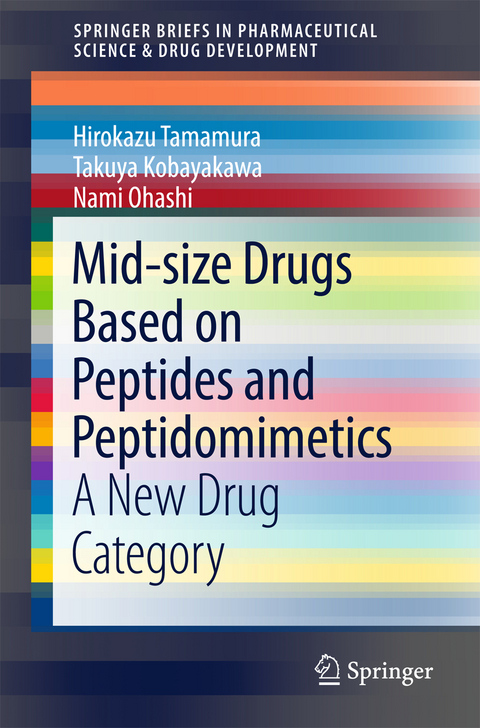
Mid-size Drugs Based on Peptides and Peptidomimetics
Springer Verlag, Singapore
978-981-10-7690-9 (ISBN)
This brief describes studies conducted by the authors on mid-size drugs utilizing peptides and peptidomimetics, and on the development of anti-HIV agents. Peptides are important biological molecules and have various physiological actions. Peptide-based drug discovery may help bring about the development of useful medicines that are highly safe and show potent pharmacological effects in small doses. Recently, it has been shown that there is an important drug-like space in the mid-sized region between low- and high-molecular-weight compounds. Thus, mid-size drugs such as peptide compounds are being focused on. To date, several peptidomimetics that mimic primary, secondary, and tertiary structures of peptides have been developed to maintain and improve biological activities and actions of peptides. In this book, the features and advantages of mid-size drugs are described in detail. In addition, the merits of utilizing peptidomimetics in the development of mid-size drugs are referred to. Understanding such peptide-derived mid-size drugs will lead to a comprehensive expansion of medicinal chemistry.
Hirokazu Tamamura received his Ph.D. in Pharmacy from Kyoto University in 1995. His research interests include chemical biology, medicinal chemistry, peptide–protein chemistry, and organic chemistry. Currently, he is a professor at Tokyo Medical and Dental University, with a total of 27 years of teaching experience at Kyoto University and Tokyo Medical and Dental University.Dr. Tamamura won the Award for Distinguished Young Scientists from the Japanese Peptide Society in 1998 and the Award for Young Scientists from the Pharmaceutical Society of Japan in 2001.He has published 230 articles and contributed to 107 books, with his work appearing in internationally renowned journals including Angew. Chem., Int. Ed., J. Am. Chem. Soc., ACS Chem. Biol., Org. Lett., J. Med. Chem., Bioconjugate Chem., ChemBioChem, ChemMedChem, Bioorg. Med. Chem., Bioorg. Med. Chem. Lett., and Biopolymers: Peptide Science. Takuya Kobayakawa received his Ph.D. from Tokyo Medical and Dental University in 2017. From 2016 to 2017, he worked as a Research Fellow of the Japan Society for the Promotion of Science under Prof. Hirokazu Tamamura. He is currently (since October 2017) an assistant professor in Prof. Tamamura’s research group at Tokyo Medical and Dental University.His research interests include synthetic organic chemistry, chemical biology, medicinal chemistry, and peptide and peptidomimetic chemistry. He has published more than 10 articles in internationally renowned journals such as Org. Lett., Bioconjugate Chem., ChemMedChem, and Tetrahedron.He has won a number of awards, including the best presentation award at the 136th Annual Meeting of the Pharmaceutical Society of Japan, the best poster award at the 52nd Japanese Peptide Symposium, etc. Nami Ohashi received her Ph.D. in Medicine from Tokyo Medical and Dental University in 2011.Her research interests includechemical biology, medicinal chemistry, and peptide–protein chemistry. Dr. Ohashi is currently an assistant professor at Tokyo Medical and Dental University, where she has 4 years of teaching experience. She won the Travel Award for Students and Young Scientists from the Japanese Peptide Society in 2007 and the Presidential Grant-in-Aid for Young Scientists from Tokyo Medical and Dental University in 2014. She has published 29 articles and contributed to 22 books. Her published articles have appeared in internationally recognized journals including Nat. Commun., Angew. Chem., Int. Ed., ACS Chem. Biol., Org. Lett., Bioconjugate Chem., ChemBioChem, ChemMedChem, Bioorg. Med. Chem., Bioorg. Med. Chem. Lett., and Biopolymers: Peptide Science.
1. Introduction of Mid-Size Drugs and Peptidomimetics.- 2. Chloroalkene Dipeptide Isosteres as Peptidomimetics.- 3. Conformational-restricted Cyclic Peptides.- 4. Peptidomimetics that Mimic Secondary Structures of Peptides.- 5.Peptidomimetics that Mimic Tertiary Structures of Peptides.- 6. Conjugated Compounds Involving Peptides.- 7. Summary and Future Perspectives of Researches on Mid-Size Drugs.
| Erscheinungsdatum | 08.02.2018 |
|---|---|
| Reihe/Serie | SpringerBriefs in Pharmaceutical Science & Drug Development |
| Zusatzinfo | 32 Illustrations, color; 8 Illustrations, black and white; XVII, 100 p. 40 illus., 32 illus. in color. |
| Verlagsort | Singapore |
| Sprache | englisch |
| Maße | 155 x 235 mm |
| Themenwelt | Medizin / Pharmazie ► Pharmazie |
| Medizin / Pharmazie ► Studium | |
| Naturwissenschaften ► Biologie ► Biochemie | |
| Naturwissenschaften ► Chemie ► Organische Chemie | |
| Naturwissenschaften ► Chemie ► Physikalische Chemie | |
| Naturwissenschaften ► Chemie ► Technische Chemie | |
| Technik | |
| Schlagworte | Administration route • Anti-HIV agent • Cyclic peptide • Mid-size drug • Peptidomimetic |
| ISBN-10 | 981-10-7690-1 / 9811076901 |
| ISBN-13 | 978-981-10-7690-9 / 9789811076909 |
| Zustand | Neuware |
| Informationen gemäß Produktsicherheitsverordnung (GPSR) | |
| Haben Sie eine Frage zum Produkt? |
aus dem Bereich


